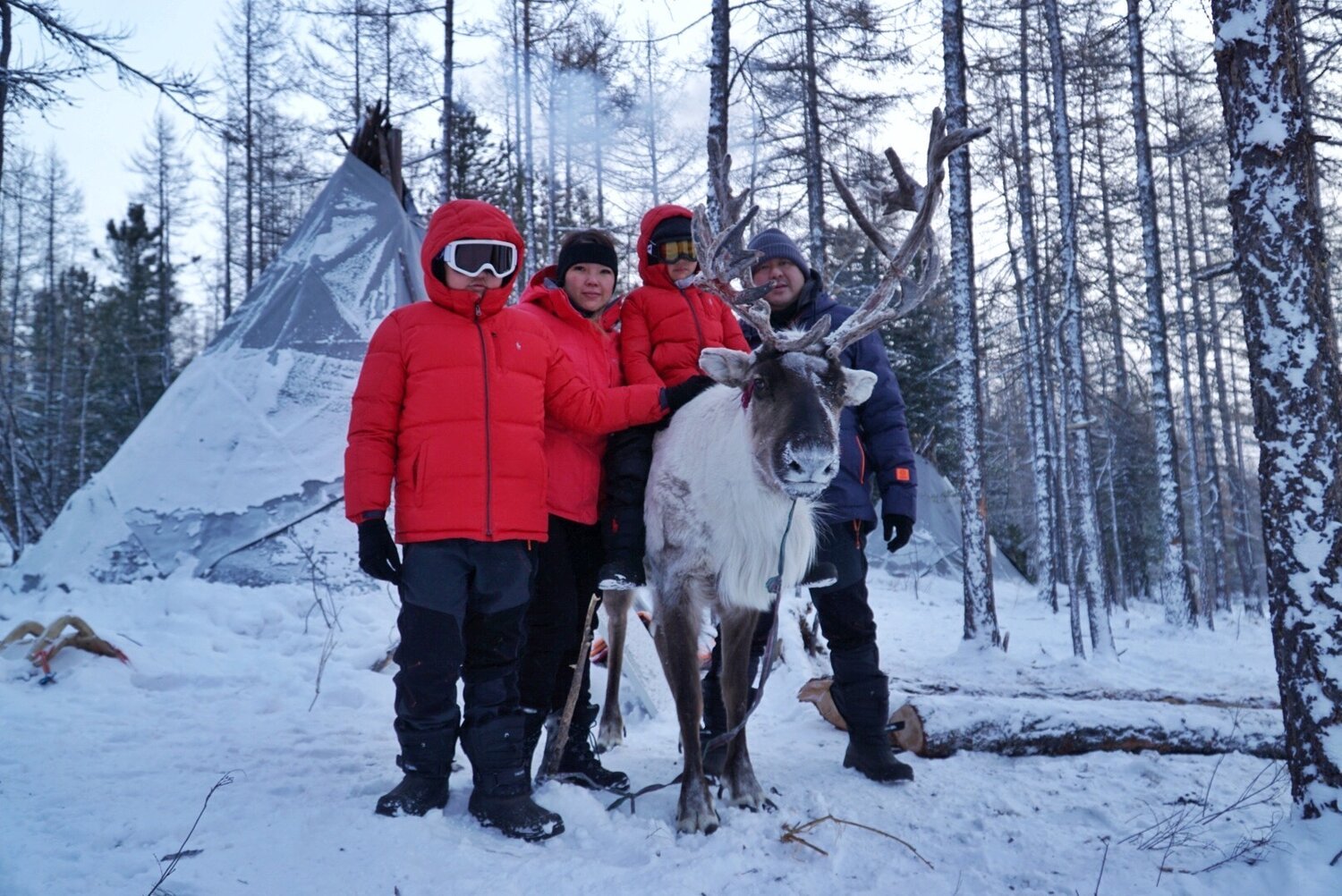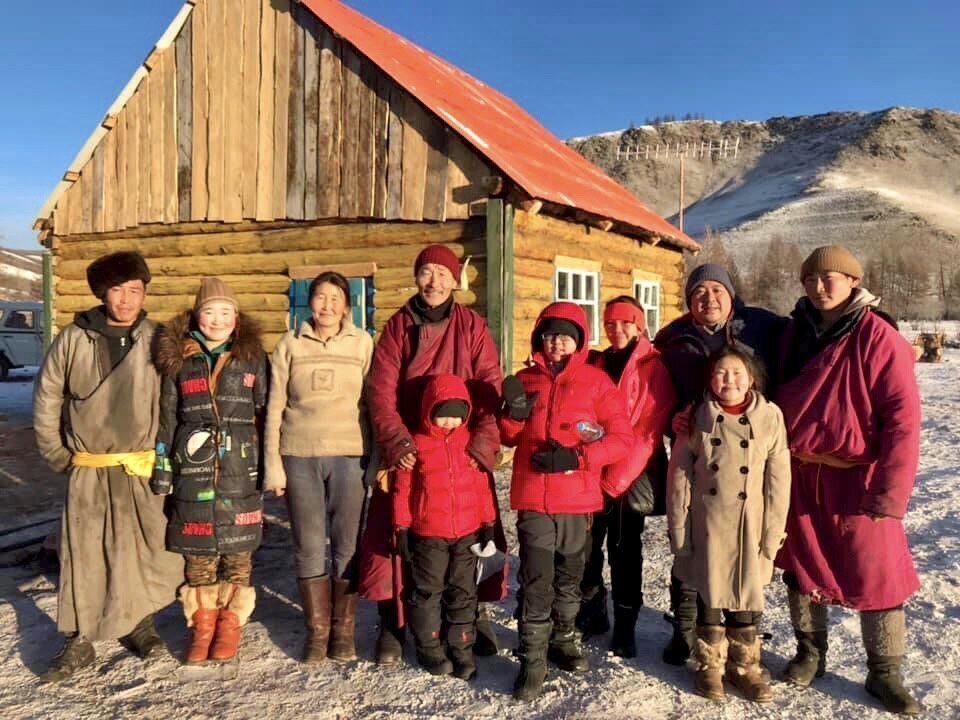THIS FAMILY MAKES CIRCUIT BREAKER LOOK EASY
Gina and her family in wintertime Mongolia
Some call her momsformer, others call her wanderwoman. Gina Pang has ran ultramarathons, scaled mountains and abseiled waterfalls - with two young kids in tow. She brings her open and adventurous approach to life to parenting independent, well-adjusted kids.
During the circuit breaker, while other kids snooze on, her two primary school boys wake themselves up at 7am each morning to go through schoolwork on their own. They even do chores, cook lunch and wash up after.
The Family: Raymond (Dad), Gina (Mom), Ethan, 12 and Ean, 8.
Clearly, parenting well in ordinary times makes parenting easy in extraordinary times. Here are Gina’s tips:
1. Expose your kids to a variety of experiences. They’ll learn to adapt.
Gina: The most adventurous thing we’ve done was our trip to Mongolia, to the Tsaatan village where the last group of nomadic reindeer herders in the world resides. It was December and temperatures at night were as cold as minus 35 degrees celsius. The kids had to stay in a ger and use long drop toilets but surprisingly they adapted very well.
The journey on the road was very long and bumpy, an average of 8 to 10 hours’ drive on some days. But the kids self-entertained with books and played with each other throughout the entire ride.
Ethan: I kept banging my head.
Gina: It was very bumpy.
Snapshots of the boys’ adventures in Mongolia.
Gina: I like to bring them on these adventure trips. Some call it “suffering”, but to me it is memorable and meaningful! There’s this teaching I practice, voluntary discomfort, where you get comfortable being uncomfortable and it makes you stronger. It teaches a lot of things - gratitude, resilience, willpower and being adaptable.
I always choose a good hotel at the end of each trip so we can appreciate things that we take for granted like having clean water at the turn of a tap. Adventure trips like this really shock you out of your routine and make you appreciate what you have.
Ean: Like a clean toilet bowl.
Ethan: And nice hot showers.
2. Every situation is an opportunity to teach your kids something new. Even staying home during the circuit breaker.
Gina: We always have a debrief after each travel experience. I like to ask them how they feel, their thoughts, what do they think of the kind of lives these people are living, and if they were them, how they would feel. It’s easier for them to empathise with the people living there when they’ve been there themselves.
The family with their Mongolian hosts.
Gina: With COVID-19, our travel plans have all been cancelled and with home-based learning (HBL), we spend a lot of time at home. Apart from HBL lessons, I’ve been focusing more on instilling self-discipline and teaching them time management during this period.
The two boys are quite disciplined, they usually wake up very early, earlier than us sometimes, to start their HBL and finish whatever schoolwork by the morning.
This period, I noticed that they have become even more independent. One time I wasn’t feeling well and slept in, my husband was at work because he’s in essential services, they prepared their own breakfast, did their HBL lessons, and even cooked their own lunch, ate and washed up. They know if they finish their work earlier, they get to enjoy their free time in the afternoon, doing what they like, like reading and building LEGO robots.
The Robots: Ethan and Ean’s LEGO robots, built from scratch.
3. Set rules and expectations. Communicate to your kids the reasons behind your words and actions.
Gina: As parents, I think the most important thing is communicating with your kids. Be very clear on rules and expectations. Explain to them why they need to do certain things, like finishing their schoolwork because it is their responsibility and helping with household chores because they are part of the family.
Lots of parents like to reward kids when they do something well. I don’t reward them because they did well or behave well. When you do well in school or your exams, that is your job. It is what you are supposed to do.
Gina, Ethan and Ean on a ZOOM call.
4. Pay attention to your kids’ interests. Learn to listen, support and trust them.
Gina: Pay attention and listen to them when they’re talking, and when they’re not talking – when they’re sending out messages with their body language. What are they interested in, what do they like to do?
For example, if I see them reading books, I probe further. I ask, do you like it? Do you want me to get the series for you?
Allow them to explore their own path, discover their strengths and passions. If there is something that interests them and they enjoy doing it, support them. If they prefer to play drums over piano, so be it. Don’t force them to learn piano just because every other kid is doing it. Through their interests, they find themselves and learn to be self-driven.
Of course, it’s not totally hands-off. If they make mistakes, correct them. If they fail, encourage them to try again. But let them bear the consequences and learn the lessons.
During circuit breaker, you get to spend a lot of time with your kids. Use this time to learn to trust them. Listen to them. Understand what they like, what they think. Then trust them to make their own decisions.
Beyond COVID-19: Circuit Breaker Stories are about individuals trying their best to deal in this time. We’re all handling circumstances unique to us, in ways coloured by our own personal histories. We’re all in this together, and we can all learn from each other.










